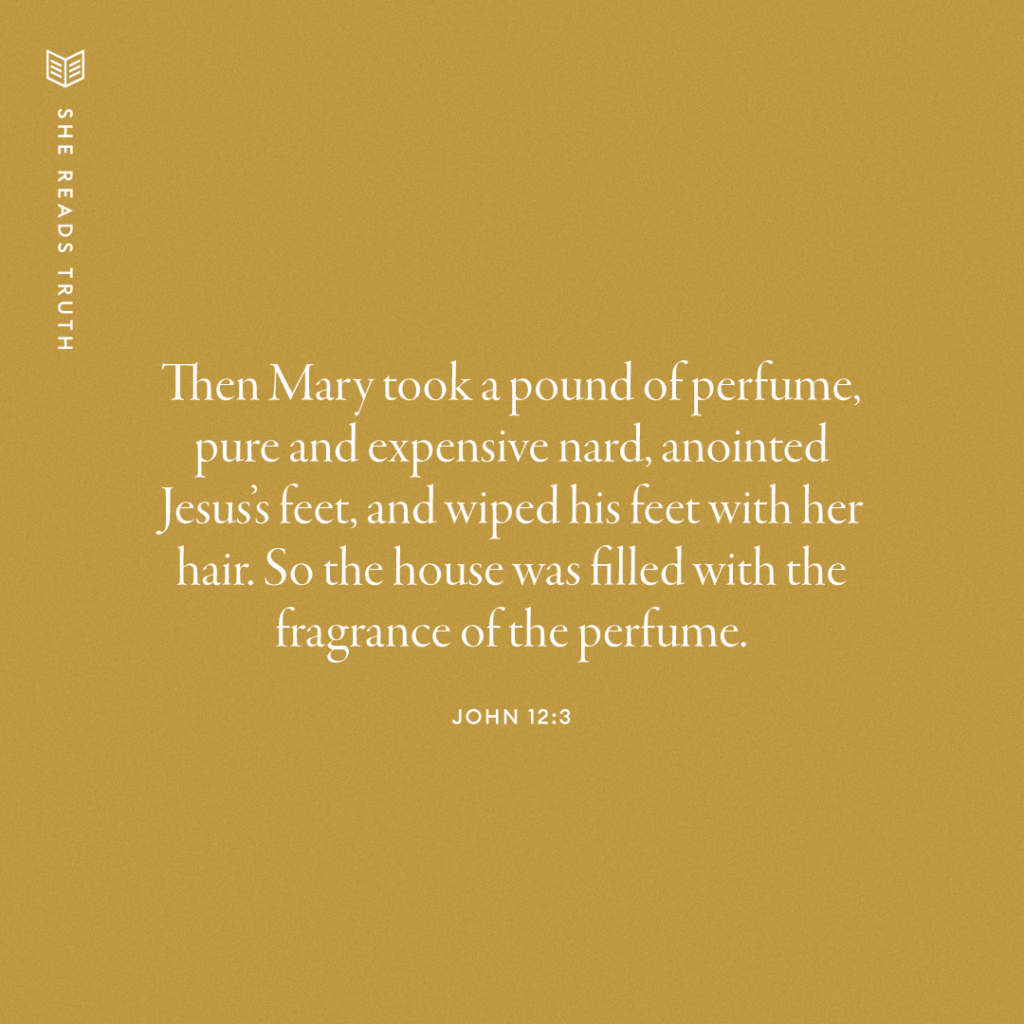The Anointed One
Open Your Bible
John 11:55-57, John 12:1-36, Exodus 30:23-33, Isaiah 61:1-3
BY Jen Yokel
What does it mean to be anointed? Growing up, I mostly heard it used in a metaphorical sense, like when you want to describe a particularly beautiful solo of a hymn that’s a little too high for most of us. (“Did you hear her sing? Wow, she’s anointed!”) And then there are people in many Christian traditions who wouldn’t think twice about dabbing a little olive oil on someone as they pray, a physical, tactile practice of symbolic weight. But as we see in today’s readings, anointing carries a rich tradition behind it, and all throughout Scripture it’s a tangible way to set someone or something apart for a holy purpose.
From our perspective, this story of Mary anointing Jesus feels like a story about extravagant, impractical worship. “Then Mary took a pound of perfume, pure and expensive nard, anointed Jesus’s feet, and wiped his feet with her hair. So the house was filled with the fragrance of the perfume” (John 12:3). Judas gripes about this foolish woman’s wastefulness. Jesus comes to her defense, honoring her actions as beautiful.
I know for most of my life, I thought the lesson I should get from this story was, “Look at how freely Mary gives her worship! You should do that too!” But if I’m honest, there’s a little bit of my reserved, practical self that wonders if maybe Judas has a point. (Just a little bit. We all know he’s the bad guy here.) Dig a little deeper, and questions start to surface. Why perfume? Why all of it, and not just a tasteful dab? Everything about this moment feels so lavish and impractical, and if I were in Mary’s shoes, I know I’d feel ashamed for being so extra.
Thankfully, Jesus doesn’t see it that way at all. He sees how Mary overflows with gratitude to her teacher, her friend, the healer who elevates her at every turn and raised her beloved brother from death. Her response echoes the work of her ancestors, who lavished their most expensive fragrant oils on priests, and instruments and altars (Exodus 30:23–33). In her world, this kind of anointing was kept for only the most sacred tasks. What could be more sacred than the anointing Jesus carried: “to bring good news to the poor…to heal the brokenhearted, to proclaim liberty to the captives…to give them…festive oil instead of mourning” (Isaiah 61:1–3)?
“Leave her alone,” the Anointed One admonishes Judas as the perfume drips from Him. “She has kept it for the day of my burial” (John 12:7). In this moment—while the plot to kill him builds to a crescendo, before He rides into Jerusalem on a humble donkey, as He continues to walk toward His destiny in Jerusalem—perhaps the gift of Mary’s anointing is the scent of courage.

75 thoughts on "The Anointed One"
-
Wow that was a really deep reflection on that passage. Thank you
-
What a great teaching. I pray that I can worship God with all I have and set Him apart in all I do and in my life. Holy Spirit, help me to always be aware of the presence of Jesus in my life.
-
Yes, I absolutely loved that connection to Exodus and of course had never noticed that before!
-
Mary and her alabaster box to annoit the savior to be in his presence glory to God!
-
❤️
-
I love that this passage of John was connected with the passage from Exodus. When talking about the the anointing oil, it is clear that it is only intended for those marked as holy. Here we see Mary pouring not a dab, but ALL of the perfume for the most holy of holy. What a beautiful image!
-
I’m noticing details about Mary in John that I never noticed before. In 11:20, when Martha heard that Jesus was coming, she went & met him, but Mary remained seated in the house. Why?! Forgive me Lord if I’m reading too much into this. Was she disappointed that Jesus had come 2-4 days after they called for Him? Was she so absorbed in her own grief/mourning that she wasn’t quite ready to face Jesus? Was she upset w/ Jesus, inwardly blaming him for her dear brothers death? Yet in 11:28-29, after her sister tells her that Jesus was calling for her, she still rose quickly & went to Him. I love that she went to meet Jesus in her grief, mourning, & pain. She went to Him as she was. There was nothing for her to fix or rectify beforehand. In v. 32, she falls at his feet, as she does in today’s passage, weeping that if He had been there, her brother wouldn’t have died. Notice that Martha pretty much says the exact same phrase in 11:21-22, yet she adds on that whatever Jesus asks of God, God will do. Did Mary’s grief/mourning lead her to question the deity of Jesus? In today’s passage, we see Mary at Jesus’ feet as a changed woman! The miracle she witnessed has changed her heart & led her to worship at his feet! He receives her now as He did before. Now, she’s before His feet having had witnessed the miracle of Jesus giving new life (physical & spiritual). I do believe that in the same way Jesus restored Lazarus’ physical self, He was also restoring his (as well as his 2 sisters) spiritual self, drawing them all to the One who gives new life for His own glory! Amen! Praise be to God for His Word!
-
The fact that they wanted to kill Lazarus because of his impact on people following Jesus is so interesting. It kind of foreshadows the church’s future persecution



Post Comments (75)